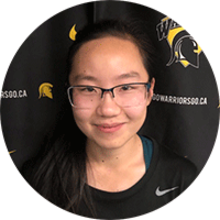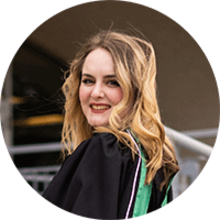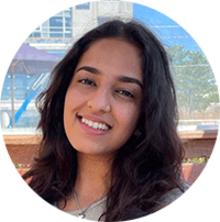
Graduates find personalized pathways to success
The ultimate goal for these Faculty of Health students is to help others

The ultimate goal for these Faculty of Health students is to help others
By Suzanne Bowness WriterThey may be graduating from different academic units, but these Faculty of Health grads show how getting a great university experience comes from following your interests, building your network and gathering skills both in and outside the classroom. Congrats to the Class of 2022!
 Evelyn Jiang loves bad jokes, runs on coffee and lives at the gym. At least that’s how this Kinesiology grad describes herself. She’s also an A student, and someone who was constantly on the lookout for new opportunities from the start.
Evelyn Jiang loves bad jokes, runs on coffee and lives at the gym. At least that’s how this Kinesiology grad describes herself. She’s also an A student, and someone who was constantly on the lookout for new opportunities from the start.
On top of co-op and a specialization in Rehabilitation Sciences, Jiang clocked more than 3,000 hours of work as a strength coach with every varsity team in Athletics and Recreation. Her work in Athletics also included being a personal trainer, a fitness instructor, strength coach for select varsity high-performance camps and Move Your Mind coordinator – a program aimed at reducing barriers to physical activity.
“What drives me to do this work and put in all this time is that ultimately, I, like many others in our Faculty, want to help people,” Jiang says. “I want to help them be the best version of themselves, whether they are an athlete competing for a starting spot, an elderly person looking to reduce pain and gain strength, or someone recovering from an injury who wants to go back to normal. I am driven by the progress they see in their journey and how I can impact their lives in a positive way.”
She also had to find her space as a woman in athletics, working in traditionally male-dominated roles where there weren’t many women, let alone people of colour. “My biggest takeaway was to not be afraid to make yourself heard – though other keys to success include not being afraid to ask for help, looking for ways to improve yourself and not being afraid to be a beginner.”
Now, Jiang has returned for a master’s degree, also in Kinesiology. After that, she plans to go to professional school for physiotherapy or perhaps sports psychology. She says all this effort has been satisfying and helps her achieve her goal of working through the complete picture of athlete needs, especially in the integration between strength and conditioning and rehabilitation.
 Abbie Simpson is a well-known name at Waterloo. The former president of the Waterloo Undergraduate Student Association (WUSA) – an autonomous non-profit that operates with a team of 50 and a budget around $40 million – is a Recreation and Leisure Studies major who is convocating this fall.
Abbie Simpson is a well-known name at Waterloo. The former president of the Waterloo Undergraduate Student Association (WUSA) – an autonomous non-profit that operates with a team of 50 and a budget around $40 million – is a Recreation and Leisure Studies major who is convocating this fall.
“Rec gave me the tools to think strategically and think about the person benefitting from programming, not just the metrics,” Simpson says. “At WUSA, I was concerned with ensuring a positive student experience for years to come. I really pulled from my program evaluation classes throughout my time there.”
Simpson coupled her major with Social Development Studies, which gave her a deeper understanding of the way policy and systems affect program creation and evaluation. “I really felt that my degree will set me up well for working in not-for-profits (like I do now) or work with municipal governments (what I would like to do in the future) as my degree has provided me with the tools to serve others.”
In her leadership journey at Waterloo, Simpson initially gained some volunteer experience helping to revive the Jack.org campus chapter, then dove into the WUSA experience, becoming an orientation coordinator and a member of WUSA’s Board of Directors. She also served on the University’s Senate and Board of Governors because of her role as WUSA president.
She gained a ton of skills in the role, from participating in a budget submission to the provincial government to creating the organization’s current five-year strategic plan. “Looking back on it, the role was incredibly rewarding because we're able to push forward on a lot of advocacy initiatives. It’s probably one of the hardest things I've ever done and ever will do.”
 As an international student, Public Health grad Neha Lakshman had to learn how to live in Canada at the same time as she was learning how to be a university student.
As an international student, Public Health grad Neha Lakshman had to learn how to live in Canada at the same time as she was learning how to be a university student.
Immediately, she realized the need to find friends and academic advisors to lean on for everything from figuring out how to apply for a social insurance number to learning how to do academic citations. She credits their support for helping her thrive through the challenges. “First year was amazing for how I grew my network – my peers helped with all of it, made my life a whole lot easier,” she recalls.
Lakshman also threw herself into coursework, graduating with Honours with Distinction from the Public Health program, with a Gerontology minor and earning the EDGE certificate. She names several favourite professors and praises all of them for their accessibility, much different than in her home country of Dubai. “Their way of teaching was not something I was used to; I was surprised they were so friendly and approachable,” says Lakshman.
Lakshman also began to contribute to her community, volunteering with the GLOW Centre for Gender and Sexual Diversity, becoming an assistant news editor at the Imprint newspaper and a research assistant with the Waterloo Political Science Department, among other roles.
Then the pandemic interrupted her studies, forcing her to return home to Dubai for a year. She was grateful to return to in-person learning. “I felt like I was missing my college life, building those connections, so I was super excited to come back and glad to finish in person.”
Today, Lakshman has landed her first full-time job, working on the admin team with Arthritis Society Canada. She hopes to work for a while, then pursue a master’s degree in health administration. Now settled into her new country and field, she urges other incoming international students to similarly take advantage of opportunities, discover their interests and ask for help as they need it.

Read more
Here are the people and events behind some of this year’s most compelling Waterloo stories

Read more
Irfhana Zakir Hussain works to strengthen Waterloo’s capacity to withstand and recover from climate-related health crises

Read more
Meet the 14 exceptional students representing Waterloo’s newest grads
The University of Waterloo acknowledges that much of our work takes place on the traditional territory of the Neutral, Anishinaabeg, and Haudenosaunee peoples. Our main campus is situated on the Haldimand Tract, the land granted to the Six Nations that includes six miles on each side of the Grand River. Our active work toward reconciliation takes place across our campuses through research, learning, teaching, and community building, and is co-ordinated within the Office of Indigenous Relations.